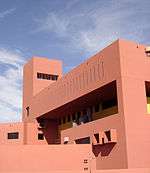Ricardo Legorreta
| Ricardo Legorreta | |
|---|---|
| Born |
Ricardo Legorreta Vilchis May 7, 1931 Mexico City |
| Died | December 30, 2011 (aged 80) |
| Nationality | Mexican |
| Alma mater | Universidad Nacional Autónoma de México |
| Occupation | Architect |
| Design | Brightly colored Cubist designs |
Ricardo Legorreta Vilchis (May 7, 1931 – December 30, 2011)[1] was a Mexican architect. He was a prolific designer of private houses, public buildings and master plans in Mexico, the United States and some other countries.[2]
He was awarded the prestigious UIA Gold Medal in 1999,[3] the AIA Gold Medal in 2000, and the Praemium Imperiale in 2011.
Life and career
Ricardo Legorreta was born on May 7, 1931, in Mexico City. He studied architecture at the Universidad Nacional Autónoma de México, from where he graduated in 1953. After working for five years with José Villagrán García, he established his own office in 1963.[2]
Architectural expression
Legorreta was a disciple of Luis Barragán and carried Barragan's ideas to a wider realm. Barragan, in the 1940s and 1950s amalgamated tradition and the modern movement in architecture yet his work is mostly limited to domestic architecture. Legorreta applied elements of Barragan's architecture in his work including bright colors, play of light and shadow, and solid Platonic geometric shapes. One of the important contributions of Legorreta has been the use of these elements in other building types such as hotels, factories as well as in commercial and educational buildings. His most famous works are the Camino Real Hotel in Mexico City, the IBM Factory in Guadalajara and the Cathedral of Managua.
Works


- Camino Real Hotel, 1965, (Col. Anzures, Mexico City, Mexico)
- Casa Lomas Altas, 1965, Mexico City
- Nissan Cuernavaca Plant1967
- IBM Guadalajara Technology Campus, 1970, Guadalajara, Mexico
- Casa Montalbán, 1985 (Hollywood, California, United States)
- Tustin Market Place, 1988 (Tustin, California, United States)
- Children's Discovery Museum of San Jose, 1990 (San Jose, California, United States)
- Museo de Arte Contemporáneo de Monterrey, 1991 (Monterrey, Nuevo León, Mexico)
- Pershing Square, 1994 (Los Angeles, California, United States)
- Metropolitan Cathedral of the Immaculate Conception, 1994 (Managua, Nicaragua)
- The Tech Museum of Innovation, 1998 (San Jose, California, United States)
- Santa Fe University of Art and Design Visual Arts Center, 1999 (Santa Fe, New Mexico, United States)
- Max Palevsky Residential Commons, 2001 (Chicago, United States)
- San Antonio Public Library, 1995 (Texas, United States)
- Latino Cultural Center, 2003 (Dallas, Texas, United States)
- Keller Estate Winery, 2003 (Petaluma, California, United States)
- Fashion and Textile Museum, 2003 (Bermondsey, London, United Kingdom)
- Secretaría de Relaciones Exteriores (Torre Tlatelolco), (Mexico City, Mexico)
- Multiplaza Panamericana, 2004 (San Salvador, El Salvador)
- UCSF Mission Bay Bakar Fitness and Recreation Center, 2005 (San Francisco, California, United States)
- Hotel La Purificadora, 2006 Puebla, Puebla, Mexico
- Texas A&M University at Qatar, 2007 (Education City, Doha, Qatar)
- Carnegie Mellon University (Qatar), 2008 (Education City, Doha, Qatar)
- Casa Del Agua Hotel, 2009 (Jeju-do, South Korea)
- Davidka Square, 2010 (Jerusalem, Israel)
- Plaza Juárez including the Museum of Memory and Tolerance and Secretaría de Relaciones Exteriores (Plaza Juárez tower), 2010 (Mexico City, Mexico)
References
- ↑ El Universal: Hijo de Legorreta afirma que murió tranquilo, 30 December 2011 (Spanish)
- 1 2 UIA: 1999 Gold Medalist Jury Citation, retrieved 31 December 2011
- ↑ UIA homepage: Laureates
Further reading
- Mutlow, John (1997). Legorreta. Rizzoli. ISBN 0-8478-2023-8.
- Legorreta, Ricardo (2004). Legorreta + Legorreta. Rizzoli. ISBN 0-8478-2598-1.
- Legorreta, Ricardo (2010). Legorreta: Arquitectura / Architecture 2003-2010. Area Editores. ISBN 978-607-8115-00-6.
External links
| Wikimedia Commons has media related to Ricardo Legorreta. |